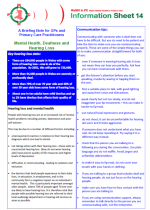Improving In Surgery Communications For The Hard of Hearing

There are 534,000 people in Wales with some form of hearing loss and Action on Hearing Loss has discovered a significant percentage face significant problems when trying to use mental health services.
This combined with the fact that they are at an increased risk of mental health problems - including anxiety, depression and poor self-esteem - means it's an issue which GPs and primacy care practitioners really need to understand.
There are a variety of simple systems which make it easier to communicate clearly with deaf patients in person once they have entered a surgery or clinic:
-
Induction Loop Systems - These should be fitted as a minimum standard within receptions and consultation areas as they allow hearing aid users to make full use of their hearing aids in potentially noisy surroundings. Staff should be capable of checking that they are working properly and be trained how to use them.
-
Visual Displays - These ensure patients with hearing loss - and other patients - can clearly see when they are being called for appointments. They are not always appropriate as people have to continuously watch them so alerter systems are helpful as they let patients know each time a new name appears on the screen.
-
Deaf Awareness - All frontline staff - including receptionists, nurses, doctors, health visitors and pharmacists - hould be trained in how to communicate effectively with someone with hearing loss. This particularly applies to staff based on inpatient wards with significant numbers of older patients. Training should be provided as part of the staff induction programme and refreshed on a regular basis with training delivered by a person who is deaf or hard of hearing.
- Calling People for an Appointment - Arrangements should be in place to ensure patients with hearing loss do not miss their appointments after arriving at a surgery or clinic. Staff should personally alert someone when the practitioner is ready to see them.
These are just some of the way mental health services can be made more accessible to people with hearing loss and you can find out more by reading our latest Information Sheet 14.
If you have any questions about Information Sheet 14 or any other queries please contact our Project Manager Lesley Hills via email at lhills@rcgp.org.uk or on 029 2050 4516.


